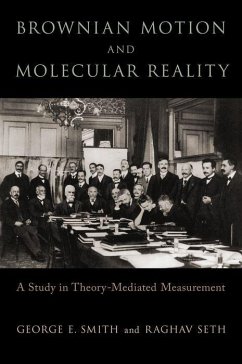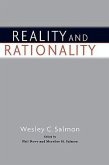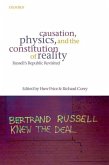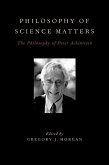- Gebundenes Buch
- Merkliste
- Auf die Merkliste
- Bewerten Bewerten
- Teilen
- Produkt teilen
- Produkterinnerung
- Produkterinnerung
Between 1905 and 1913, French physicist Jean Perrin's experiments on Brownian motion ostensibly put a definitive end to the long debate regarding the real existence of molecules, proving the atomic theory of matter. While Perrin's results had a significant impact at the time, later examination of his experiments questioned whether he really gained experimental access to the molecular realm. In this case study in the history and philosophy of science, George E. Smith and Raghav Seth here argue that despite doubts, Perrin's measurements were nevertheless exemplars of theory-mediated…mehr
Andere Kunden interessierten sich auch für
![Reality and Rationality Reality and Rationality]() Wesley C SalmonReality and Rationality155,99 €
Wesley C SalmonReality and Rationality155,99 €![Causation, Physics, and the Constitution of Reality Causation, Physics, and the Constitution of Reality]() Huw Price / Richard Corry (eds.)Causation, Physics, and the Constitution of Reality183,99 €
Huw Price / Richard Corry (eds.)Causation, Physics, and the Constitution of Reality183,99 €![Basic Structures of Reality Basic Structures of Reality]() Colin McginnBasic Structures of Reality99,99 €
Colin McginnBasic Structures of Reality99,99 €![Mind and Motion and Monism Mind and Motion and Monism]() George John RomanesMind and Motion and Monism17,90 €
George John RomanesMind and Motion and Monism17,90 €![Everywhere and Everywhen Everywhere and Everywhen]() Nick HuggettEverywhere and Everywhen101,99 €
Nick HuggettEverywhere and Everywhen101,99 €![Value-Free Science Value-Free Science]() Harold Kincaid / John Dupré / Alison Wylie (eds.)Value-Free Science98,99 €
Harold Kincaid / John Dupré / Alison Wylie (eds.)Value-Free Science98,99 €![Philosophy of Science Matters Philosophy of Science Matters]() Philosophy of Science Matters91,99 €
Philosophy of Science Matters91,99 €-
-
-
Between 1905 and 1913, French physicist Jean Perrin's experiments on Brownian motion ostensibly put a definitive end to the long debate regarding the real existence of molecules, proving the atomic theory of matter. While Perrin's results had a significant impact at the time, later examination of his experiments questioned whether he really gained experimental access to the molecular realm. In this case study in the history and philosophy of science, George E. Smith and Raghav Seth here argue that despite doubts, Perrin's measurements were nevertheless exemplars of theory-mediated measurement-the practice of obtaining values for an inaccessible quantity by inferring them from an accessible proxy via theoretical relationships between them. They argue that it was actually Perrin more than any of his contemporaries who championed this approach during the years in question.
Produktdetails
- Produktdetails
- Verlag: Oxford University Press, USA
- Seitenzahl: 468
- Erscheinungstermin: 14. September 2020
- Englisch
- Abmessung: 236mm x 160mm x 41mm
- Gewicht: 771g
- ISBN-13: 9780190098025
- ISBN-10: 0190098023
- Artikelnr.: 59886186
- Verlag: Oxford University Press, USA
- Seitenzahl: 468
- Erscheinungstermin: 14. September 2020
- Englisch
- Abmessung: 236mm x 160mm x 41mm
- Gewicht: 771g
- ISBN-13: 9780190098025
- ISBN-10: 0190098023
- Artikelnr.: 59886186
George E. Smith joined the Philosophy Department of Tufts University in 1977. He specializes in the critical assessment of evidence in the physical sciences especially during historical transitions in which areas of research go from struggling to extract high quality evidence out of data to becoming exceptionally effective in doing so. He served as Acting Director of the Dibner Institute for the History of Science and Technology at MIT from 2001 until 2006 and has twice been a Distinguished Visiting Professor in the Philosophy Department of Stanford University. Raghav Seth graduated from Tufts University in 2012 with a B.A. in Philosophy. After college, he worked as a research assistant at the McGovern Institute for Brain Research at MIT and then as an EMT in Essex County before transitioning to medical school at the Tufts University School of Medicine from which he graduated in 2018. He is currently an anesthesiology resident at Beth Israel Deaconess Medical Center.
Preface
Bibliographical Notice
Chapter 1. Introduction
1.1 Brownian Motion and Molecular Reality: The "Lore"
1.2 Two Issues
1.3 Challenges to Our Second Issue
1.4 Why the Focus So Narrowly on Perrin?
1.5 Organization of the Monograph
Chapter 2. The Historical Background: Molecular Theory as of 1900
2.1 On the "Hypothetical" Status of the Molecular Hypothesis
2.2 Kinetic Theory as a Means of Gaining Access to Molecules
2.3 The Problem Posed by the Specific Heats of Gases
2.4 Ostwald on How a Hypothesis Can Become Something More
2.5 A Further Dimension of the Dispute over Molecular-Kinetic Theory
2.6 A Major Development in Support of the Molecular Hypothesis
2.7 Ions in Solutions: van't Hoff, Arrhenius, Ostwald, and Nernst
2.8 By What Authority Still Only a Hypothesis?
Chapter 3. The Historical Bakcground: Brownian Motion
3.1 The Promise of Brownian Motion
3.2 Granular Velocity Measurement: A Failure in Experimentation
3.3 Explaining Granular Velocities: A Failure in Theory-Mediation
3.4 The Problem Reconsidered; The Promise Delivered
3.5 The History in Retrospect
Chapter 4. Perrin's Brownian Motion Experiments
4.1 Some Preliminaries
4.2 Perrin's Vertical-Gradient Experiments
4.3 Perrin's Vertical-Gradient Results Re-Examined
4.4 Perrin's Granule-Displacement Experiments: The Two Measures
4.5 Perrin's Granule-Displacement Experiments: Displacement Results
4.6 Perrin's Granule-Displacement Experiments: Diffusion Results
4.7 Perrin's Granule Rotation Experiments
4.8 The Three Different Types of Experiment, Taken Together
4.9 Some Remarks about "Well-Behaved" Theory-Mediated Measurements
4.10 A Critical Assessment of Perrin's Results at the Time
Chapter 5. Implications for Molecular-Kinetic Theory
5.1 Testing Molecular-Kinetic Theory: The Kinetic Energy "Test"
5.2 Testing Molecular-Kinetic Theory: Other "Tests"
5.3 Grounding Molecular-Kinetic Theory
5.4 Parallels with Molecular-Kinetic Theory
5.5 Continuity with Molecular-Kinetic Theory
5.6 Continuity from Granule to Liquid Substrate
5.7 A Brief Recap
Chapter 6. Converging Values of Avogadro's Number: Perrin's Comparisons
6.1 Some Historical Background
6.2 What Agreeing Measurements?
6.3 Perrin's Comparisons, Individually
6.4 Perrin on the Values # 62 x 10^22
6.5 Perrin's Comparisons, Collectively
6.6 "Les Preuves de la Réalité Moléculaire"?
6.7 On Eliminating All Reference to the Invisible
6.8 A Parting Comment, re réalité moléculaire
Chapter 7. Our Initial Issues, Revisited
7.1 Conclusions Established About Brownian Motion
7.2 Perrin's Contribution to the New Standing
7.3 The New Standing of Molecular Theory: Ostwald's "Conversion"
7.4 The New Standing of Molecular Theory: In the Aftermath of Solvay
7.5 On the Standing of Hypotheses
7.6 1905-1913 Within the History of Theory-Mediated Measurement
Postcript on the Realism-Instrumentalism Debate
1. On the Scientific Literature
2. On Some Key Distinctions
3. On What Has Claim to Being Permanent
Appendix: On Ostwald (1889-90), Nernst (1893), and Meyer (1899)
Glossary
Scientific Terminology
Theory-mediated Measurement Terminology
Bibliography
Bibliographical Notice
Chapter 1. Introduction
1.1 Brownian Motion and Molecular Reality: The "Lore"
1.2 Two Issues
1.3 Challenges to Our Second Issue
1.4 Why the Focus So Narrowly on Perrin?
1.5 Organization of the Monograph
Chapter 2. The Historical Background: Molecular Theory as of 1900
2.1 On the "Hypothetical" Status of the Molecular Hypothesis
2.2 Kinetic Theory as a Means of Gaining Access to Molecules
2.3 The Problem Posed by the Specific Heats of Gases
2.4 Ostwald on How a Hypothesis Can Become Something More
2.5 A Further Dimension of the Dispute over Molecular-Kinetic Theory
2.6 A Major Development in Support of the Molecular Hypothesis
2.7 Ions in Solutions: van't Hoff, Arrhenius, Ostwald, and Nernst
2.8 By What Authority Still Only a Hypothesis?
Chapter 3. The Historical Bakcground: Brownian Motion
3.1 The Promise of Brownian Motion
3.2 Granular Velocity Measurement: A Failure in Experimentation
3.3 Explaining Granular Velocities: A Failure in Theory-Mediation
3.4 The Problem Reconsidered; The Promise Delivered
3.5 The History in Retrospect
Chapter 4. Perrin's Brownian Motion Experiments
4.1 Some Preliminaries
4.2 Perrin's Vertical-Gradient Experiments
4.3 Perrin's Vertical-Gradient Results Re-Examined
4.4 Perrin's Granule-Displacement Experiments: The Two Measures
4.5 Perrin's Granule-Displacement Experiments: Displacement Results
4.6 Perrin's Granule-Displacement Experiments: Diffusion Results
4.7 Perrin's Granule Rotation Experiments
4.8 The Three Different Types of Experiment, Taken Together
4.9 Some Remarks about "Well-Behaved" Theory-Mediated Measurements
4.10 A Critical Assessment of Perrin's Results at the Time
Chapter 5. Implications for Molecular-Kinetic Theory
5.1 Testing Molecular-Kinetic Theory: The Kinetic Energy "Test"
5.2 Testing Molecular-Kinetic Theory: Other "Tests"
5.3 Grounding Molecular-Kinetic Theory
5.4 Parallels with Molecular-Kinetic Theory
5.5 Continuity with Molecular-Kinetic Theory
5.6 Continuity from Granule to Liquid Substrate
5.7 A Brief Recap
Chapter 6. Converging Values of Avogadro's Number: Perrin's Comparisons
6.1 Some Historical Background
6.2 What Agreeing Measurements?
6.3 Perrin's Comparisons, Individually
6.4 Perrin on the Values # 62 x 10^22
6.5 Perrin's Comparisons, Collectively
6.6 "Les Preuves de la Réalité Moléculaire"?
6.7 On Eliminating All Reference to the Invisible
6.8 A Parting Comment, re réalité moléculaire
Chapter 7. Our Initial Issues, Revisited
7.1 Conclusions Established About Brownian Motion
7.2 Perrin's Contribution to the New Standing
7.3 The New Standing of Molecular Theory: Ostwald's "Conversion"
7.4 The New Standing of Molecular Theory: In the Aftermath of Solvay
7.5 On the Standing of Hypotheses
7.6 1905-1913 Within the History of Theory-Mediated Measurement
Postcript on the Realism-Instrumentalism Debate
1. On the Scientific Literature
2. On Some Key Distinctions
3. On What Has Claim to Being Permanent
Appendix: On Ostwald (1889-90), Nernst (1893), and Meyer (1899)
Glossary
Scientific Terminology
Theory-mediated Measurement Terminology
Bibliography
Preface
Bibliographical Notice
Chapter 1. Introduction
1.1 Brownian Motion and Molecular Reality: The "Lore"
1.2 Two Issues
1.3 Challenges to Our Second Issue
1.4 Why the Focus So Narrowly on Perrin?
1.5 Organization of the Monograph
Chapter 2. The Historical Background: Molecular Theory as of 1900
2.1 On the "Hypothetical" Status of the Molecular Hypothesis
2.2 Kinetic Theory as a Means of Gaining Access to Molecules
2.3 The Problem Posed by the Specific Heats of Gases
2.4 Ostwald on How a Hypothesis Can Become Something More
2.5 A Further Dimension of the Dispute over Molecular-Kinetic Theory
2.6 A Major Development in Support of the Molecular Hypothesis
2.7 Ions in Solutions: van't Hoff, Arrhenius, Ostwald, and Nernst
2.8 By What Authority Still Only a Hypothesis?
Chapter 3. The Historical Bakcground: Brownian Motion
3.1 The Promise of Brownian Motion
3.2 Granular Velocity Measurement: A Failure in Experimentation
3.3 Explaining Granular Velocities: A Failure in Theory-Mediation
3.4 The Problem Reconsidered; The Promise Delivered
3.5 The History in Retrospect
Chapter 4. Perrin's Brownian Motion Experiments
4.1 Some Preliminaries
4.2 Perrin's Vertical-Gradient Experiments
4.3 Perrin's Vertical-Gradient Results Re-Examined
4.4 Perrin's Granule-Displacement Experiments: The Two Measures
4.5 Perrin's Granule-Displacement Experiments: Displacement Results
4.6 Perrin's Granule-Displacement Experiments: Diffusion Results
4.7 Perrin's Granule Rotation Experiments
4.8 The Three Different Types of Experiment, Taken Together
4.9 Some Remarks about "Well-Behaved" Theory-Mediated Measurements
4.10 A Critical Assessment of Perrin's Results at the Time
Chapter 5. Implications for Molecular-Kinetic Theory
5.1 Testing Molecular-Kinetic Theory: The Kinetic Energy "Test"
5.2 Testing Molecular-Kinetic Theory: Other "Tests"
5.3 Grounding Molecular-Kinetic Theory
5.4 Parallels with Molecular-Kinetic Theory
5.5 Continuity with Molecular-Kinetic Theory
5.6 Continuity from Granule to Liquid Substrate
5.7 A Brief Recap
Chapter 6. Converging Values of Avogadro's Number: Perrin's Comparisons
6.1 Some Historical Background
6.2 What Agreeing Measurements?
6.3 Perrin's Comparisons, Individually
6.4 Perrin on the Values # 62 x 10^22
6.5 Perrin's Comparisons, Collectively
6.6 "Les Preuves de la Réalité Moléculaire"?
6.7 On Eliminating All Reference to the Invisible
6.8 A Parting Comment, re réalité moléculaire
Chapter 7. Our Initial Issues, Revisited
7.1 Conclusions Established About Brownian Motion
7.2 Perrin's Contribution to the New Standing
7.3 The New Standing of Molecular Theory: Ostwald's "Conversion"
7.4 The New Standing of Molecular Theory: In the Aftermath of Solvay
7.5 On the Standing of Hypotheses
7.6 1905-1913 Within the History of Theory-Mediated Measurement
Postcript on the Realism-Instrumentalism Debate
1. On the Scientific Literature
2. On Some Key Distinctions
3. On What Has Claim to Being Permanent
Appendix: On Ostwald (1889-90), Nernst (1893), and Meyer (1899)
Glossary
Scientific Terminology
Theory-mediated Measurement Terminology
Bibliography
Bibliographical Notice
Chapter 1. Introduction
1.1 Brownian Motion and Molecular Reality: The "Lore"
1.2 Two Issues
1.3 Challenges to Our Second Issue
1.4 Why the Focus So Narrowly on Perrin?
1.5 Organization of the Monograph
Chapter 2. The Historical Background: Molecular Theory as of 1900
2.1 On the "Hypothetical" Status of the Molecular Hypothesis
2.2 Kinetic Theory as a Means of Gaining Access to Molecules
2.3 The Problem Posed by the Specific Heats of Gases
2.4 Ostwald on How a Hypothesis Can Become Something More
2.5 A Further Dimension of the Dispute over Molecular-Kinetic Theory
2.6 A Major Development in Support of the Molecular Hypothesis
2.7 Ions in Solutions: van't Hoff, Arrhenius, Ostwald, and Nernst
2.8 By What Authority Still Only a Hypothesis?
Chapter 3. The Historical Bakcground: Brownian Motion
3.1 The Promise of Brownian Motion
3.2 Granular Velocity Measurement: A Failure in Experimentation
3.3 Explaining Granular Velocities: A Failure in Theory-Mediation
3.4 The Problem Reconsidered; The Promise Delivered
3.5 The History in Retrospect
Chapter 4. Perrin's Brownian Motion Experiments
4.1 Some Preliminaries
4.2 Perrin's Vertical-Gradient Experiments
4.3 Perrin's Vertical-Gradient Results Re-Examined
4.4 Perrin's Granule-Displacement Experiments: The Two Measures
4.5 Perrin's Granule-Displacement Experiments: Displacement Results
4.6 Perrin's Granule-Displacement Experiments: Diffusion Results
4.7 Perrin's Granule Rotation Experiments
4.8 The Three Different Types of Experiment, Taken Together
4.9 Some Remarks about "Well-Behaved" Theory-Mediated Measurements
4.10 A Critical Assessment of Perrin's Results at the Time
Chapter 5. Implications for Molecular-Kinetic Theory
5.1 Testing Molecular-Kinetic Theory: The Kinetic Energy "Test"
5.2 Testing Molecular-Kinetic Theory: Other "Tests"
5.3 Grounding Molecular-Kinetic Theory
5.4 Parallels with Molecular-Kinetic Theory
5.5 Continuity with Molecular-Kinetic Theory
5.6 Continuity from Granule to Liquid Substrate
5.7 A Brief Recap
Chapter 6. Converging Values of Avogadro's Number: Perrin's Comparisons
6.1 Some Historical Background
6.2 What Agreeing Measurements?
6.3 Perrin's Comparisons, Individually
6.4 Perrin on the Values # 62 x 10^22
6.5 Perrin's Comparisons, Collectively
6.6 "Les Preuves de la Réalité Moléculaire"?
6.7 On Eliminating All Reference to the Invisible
6.8 A Parting Comment, re réalité moléculaire
Chapter 7. Our Initial Issues, Revisited
7.1 Conclusions Established About Brownian Motion
7.2 Perrin's Contribution to the New Standing
7.3 The New Standing of Molecular Theory: Ostwald's "Conversion"
7.4 The New Standing of Molecular Theory: In the Aftermath of Solvay
7.5 On the Standing of Hypotheses
7.6 1905-1913 Within the History of Theory-Mediated Measurement
Postcript on the Realism-Instrumentalism Debate
1. On the Scientific Literature
2. On Some Key Distinctions
3. On What Has Claim to Being Permanent
Appendix: On Ostwald (1889-90), Nernst (1893), and Meyer (1899)
Glossary
Scientific Terminology
Theory-mediated Measurement Terminology
Bibliography








